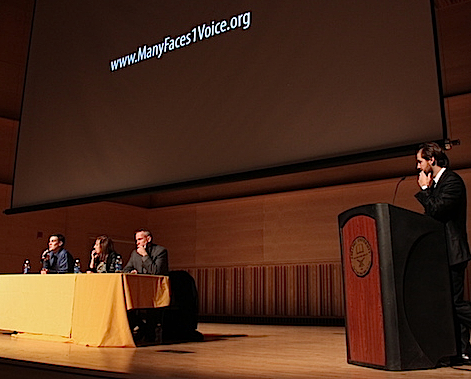Greg Williams, filmmaker of The Anonymous People, was part of a panel that discussed addiction recovery.
by Ela Schwartz

(From left) Greg Williams, Audrey Freshman and Jeff Reynolds participated in a panel discussion moderated by Steve Pinto.
Stoner. Lush. Dope fiend. Loser. In the documentary The Anonymous People, viewers vicariously sit in on a meeting where people in recovery from drug addiction or alcoholism offer up such derogatory terms as examples of how society describes them. No wonder so many of those recovering from substance use prefer to remain anonymous.
These negative perceptions are what Greg Williams, filmmaker of The Anonymous People, says he wants to “tear down.”
Since the Adelphi University School of Social Work is active in educating mental health professionals in helping clients overcome addiction, it was a natural fit for the School to present a screening of the film at the Performing Arts Center (AUPAC). Almost 300 people attended the event, which was co-presented by Caron Treatment Centers, the Long Island Council on Alcoholism and Drug Dependence (LICADD) and Life Center Counseling & Health Services, which was founded by Kay and Barbara Posillico, a mother-daughter team who are both alumnae of the School of Social Work.
Donations were requested to benefit Long Island Recovery Association (LIRA). Richard Buckman, president of LIRA, said, “We want to inspire people to change policy and get the word out to communities that recovery works.”
The Anonymous People features individuals such as former National Basketball Association (NBA) player Chris Herren, actress Kristen Johnston, former Rhode Island Senator Tom Coderre and Mr. Williams himself, all of whom have come forward to tell their stories and state publicly that recovery works. While not downplaying 12-step programs such as Alcoholics Anonymous, which have worked for many individuals, the fledgling recovery movement encourages those recovering from addiction, as well as their friends and families, to bury the shame, stop being anonymous people and join them in advocating for positive change. As the film points out, 23.5 million Americans are in recovery. The United States spends $350 billion to battle addiction, a mere 2 percent of which goes toward prevention and treatment.
Mr. Williams introduced his film and, afterward, he, Jeff Reynolds, Ph.D., executive director of LICADD, and Audrey Freshman, Ph.D., director of continuing education and professional development for the Adelphi University School of Social Work, participated in a panel moderated by Steven J. Pinto, LMHC, in which they answered questions from the audience and offered their views on policy, prevention, treatment and overcoming anonymity.
“Denial is a huge component,” Mr. Williams said. “People and families are not seeking help, but there is help out there. Community is the backbone of the recovery movement.”
“There is a parallel with the AIDS movement,” Dr. Reynolds explained, “in which young men were dying and no one did anything about it.” The recovery movement is following the example of AIDS activists who proclaimed that “Silence = Death” and braved the stigma of homosexuality to make great gains in educating society about HIV and AIDS and advocating for better policy and more research.

Greg Williams, center, and Audrey Freshman, right, met with audience members after the event.
After the Q-and-A, panel members stayed to meet individually with audience members. “Some thanked me for the film,” Mr. Williams said. “Some told me stories of loss, and others asked how they could get involved.”
It’s the type of reaction he’s been receiving at all his film screenings. In response, Mr. Williams partnered with the organization Faces and Voices of Recovery to create the ManyFaces1Voice.org website in which people are encouraged to share their stories and find out where they can attend a screening of The Anonymous People.
For further information, please contact:
Todd Wilson
Strategic Communications Director
p – 516.237.8634
e – twilson@adelphi.edu